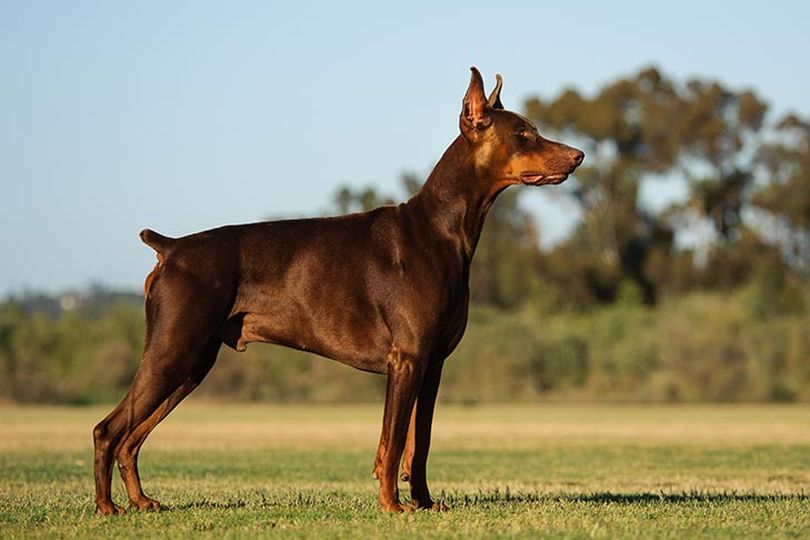Dog Breed
Doberman Pinscher
BraniacGuard DogSpeedster

- Full Name
- Doberman Pinscher
- Alternate Names
- Doberman, Warlock (term used for large doberman)
- Your PupScore
- Take the best dog breed quiz to get your Pup Scores!
- Life Span
- 10 years
- Weight
- 66 - 88 pounds
- Description
The Doberman is both sleek and powerful. It is beautiful, yet intimidating. It has a serious look yet can be a total goof. It can have a reputation as a dangerous dog, but is it a fair one? It seems the Doberman is full of contradictions in some ways, but one thing is for sure- the dog does require an experienced owner who is willing to put in time into both exercise and training. The reward will be an amazing Doberman with a good temperament, who can serve as a guard dog, yet is friendly with family and other dogs. Due to their intelligence and ability to be well trained, they can serve as both police dogs and service dogs.
- Origin
- Germany
- Bred For
- Guardian
- Family Considerations
- Overall Ease of Breed
- Personality
- Home and Environment Considerations
- Physical Characteristics
Child Friendly
4/5
Is the Doberman Pinscher good with children?
Yes, the Doberman Pinscher is very friendly with children. We still recommend introductions to children while they are young so they get used to them, but the Doberman Pinscher naturally loves children.
Stranger Friendly
2/5
Is the Doberman Pinscher friendly with strangers?
The Doberman Pinscher is not automatically friendly with strangers and we would not recommend for a living situation with frequent guests.
Dog Friendly
2/5
Is the Doberman Pinscher friendly with other dogs?
The Doberman Pinscher is not naturally friendly with other dogs, but with a good amount of early socialization as a puppy they can learn to get along with most breeds of dog. Proper training is required before letting the Doberman Pinscher go off-leash or to dog parks.
Likes to Cuddle
2/5
Does the Doberman Pinscher like to cuddle?
The Doberman Pinscher is not a cuddle bug, but it can still appreciate affection. It just has different boundaries with physical affection.
Playfulness
3/5
Does the Doberman Pinscher like to play?
The Doberman Pinscher is playful both as a puppy and as an adult dog. As they get older they may appreciate their alone time, and may not be in the mood for constant play, but certainly will have plenty of time for play as well.
Service Dog Ability
4/5
Does the Doberman Pinscher make a good service dog?
The Doberman Pinscher can be a service dog with the proper training. Doberman Pinschers are not the most common service dog, but they certainly can be if their personality matches- smart, patient, and extremely dedicated to their owner.
Ease for Novice
2/5
Is the Doberman Pinscher good for first-time owners?
The Doberman Pinscher would not be the best fit for first-time owners. A breed is only good for first-time owners if it is raised for home companionship, and is open to training and is motivated to please its owner.
Training Potential
5/5
How well can the Doberman Pinscher be trained?
The Doberman Pinscher can be trained to the highest level and is oftentimes seen in various competitions. The Doberman Pinscher is not only intelligent, but it wants to please its owner and is motivated with competition, especially if it feels like it has a job assigned to it.
Amount of Shedding
2/5
Does the Doberman Pinscher shed a lot?
The Doberman Pinscher does shed, but less than average.
Ease of Grooming
5/5
Is the Doberman Pinscher easy to groom?
The Doberman Pinscher requires very little grooming relative to other dog breeds, their coat is very low maintenance.
Exercise Need
5/5
Does the Doberman Pinscher need a lot of exercise?
The Doberman Pinscher needs a daily exercise partner! The Doberman Pinscher is best suited for a family where it will get plenty of daily exercise; it has so much energy that exercise is mandatory to avoid destructive behaviors.
Intelligence
5/5
How smart is the Doberman Pinscher?
The Doberman Pinscher is one of the smartest dog breeds. Having a very smart dog is fun, but it is also demanding- they require mental challenge and stimulation just as much as physical exercise.
Amount of Barking
2/5
How much does the Doberman Pinscher bark? Does the Doberman Pinscher bark too much?
The Doberman Pinscher occasionally barks, but only for specific reasons such as when they need something, for protection, etc.
Guard Dog Ability
5/5
Is the Doberman Pinscher a good guard dog?
The Doberman Pinscher can serve as an excellent guard dog. It is both physically intimidating and also enjoys having a "job" to protect its family and property.
Tolerates Being Alone
4/5
Is the Doberman Pinscher good at staying alone? Is the Doberman Pinscher independent?
The Doberman Pinscher prefers having family around at all times, but can also do well when left alone. The Doberman Pinscher still needs plenty of attention, but is independent, and can typically be left alone for several hours without issues.
Good for Apartment Living
2/5
Is the Doberman Pinscher a good apartment dog?
The Doberman Pinscher is not a good dog for apartment living for several reasons. It is still possible to make it work if the owner is dedicated to plenty of training and daily exercise, but it may be challenging.
Size
3/5
How big is the Doberman Pinscher?
The Doberman Pinscher is a medium sized dog breed. They can range in size depending on genetics, and males are larger on average than females.
Tolerates Heat
5/5
How much does the Doberman Pinscher tolerate hot weather? When is it too hot for a Doberman Pinscher?
The Doberman Pinscher can do very well in hot weather. Owners should still be aware of over-heating as this is one of the most common reasons for dogs going into the emergency room, but overall the Doberman Pinscher can do well in hot climates.
Tolerates Cold
3/5
How much does the Doberman Pinscher tolerate cold weather? When is it too cold for a Doberman Pinscher?
The Doberman Pinscher can tolerate some cold, but should not be over-exposed to cold weather. In general, they can live in cold weather climates, but may need clothing on particularly cold evenings or in snow.
Potential to Run Away
3/5
Does the Doberman Pinscher try to run away?
The Doberman Pinscher does sometimes run away. This is especially true if they are distracted, or see other cats or dogs. They probably won't go out of their way to "escape", but a fenced yard is still recommended.
General Health
3/5
Is the Doberman Pinscher a healthy dog? The health of a Doberman Pinscher should be measured not just by how many years they live, but also by how many health issues they've had. It is important to know which health conditions your breed is prone to- hip problems, eye problems, bloating, and arthritis are all common dog health problems.
The Doberman Pinscher is healthy, but has an average number of health risks that should be taken into consideration.
Energy Level
4/5
How energetic is the Doberman Pinscher?
The Doberman Pinscher has a lot of energy and this needs to be considered before bringing the Doberman Pinscher into your home. Can you give your Doberman Pinscher enough exercise? They will need several small daily walks, or a large dog park trip to get all of the energy out.
Amount of Drooling
2/5
How much does the Doberman Pinscher drool?
The Doberman Pinscher drools very little, typically to where it's never a concern.
Prey Drive
2/5
Does the Doberman Pinscher have a large prey drive? Does the Doberman Pinscher like to chase birds, cats, and other small animals?
The Doberman Pinscher has some prey drive, so should not be left alone with very small animals such as birds, mice, or gerbils, but with some gradual introduction should be fine living with a cat in the same home.
Athleticism
4/5
Is the Doberman Pinscher atheltic?
The Doberman Pinscher is very athletic and would be well suited for a family that frequently works out or goes on adventures.
Breed Variations
American
Black and Rust
European
Fawn
White
 Dog
Dog- Working
- Pinscher
- Doberman Pinscher
The Doberman Pinscher is a purebred dog that belongs to the Pinscher sub group, which falls under the larger Working dog breed group.
Working group: Working dogs encompass a wide range of different breeds- but they all were bred to assist people, so they are used to working hard. It is important for them to feel they have a "job" as their roles traditionally have varied from rescuing people to pulling sleds.
Because of their large size and intensity, they may be a handful for first time dog owners. On the other side, they can be trained well, so any owner who can exercise and dedicate to training their working dog, will be well rewarded. A common misconception may be that the working dog's jobs are only in physically challenging jobs; actually working dogs can also make excellent service dogs, since they are also kind and attentive to their owners.
Pinscher sub-group: The pinscher is a true German classic. They are one of the oldest breeds, and have been used for a variety of uses: from aesthetic dog shows, to police force work. The Pinscher can be trained well, as they are very intelligent and have a switch where they can suddenly become "serious".
Pinschers are typically healthy dogs, although there are a few conditions that the breed can be prone to. Pinschers can most commonly have hip dysplasia and eye disease. Smaller pinschers are known to "nip" as they were bred to hunt rats. On the other side of the spectrum- doberman pinschers will not be so bite friendly, but are excellent guard dogs.
Because of pinschers serious and demanding nature, they need a strong leader, and need to be socialized early and often. If that is the case, you will receive an excellent dog.
Doberman Pinschers for adoption
Similar Breeds


